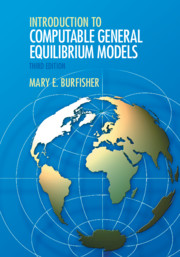Book contents
- Introduction to Computable General Equilibrium Models
- Introduction to Computable General Equilibrium Models
- Copyright page
- Dedication
- Contents
- Figures
- Tables
- Text Boxes
- Acknowledgments
- About This Book
- 1 Introduction to Computable General Equilibrium Models
- 2 Elements of a Computable General Equilibrium Model
- 3 The CGE Model Database
- 4 Final Demand in a CGE Model
- 5 Supply in a CGE Model
- 6 Factors of Production in a CGE Model
- 7 Trade in a CGE Model
- 8 Taxes in a CGE Model
- 9 Regulations in a CGE Model
- 10 Conclusion
- Model Exercises
- Practice and Review Answer Key
- Model Exercise Answer Key
- Book part
- Glossary
- References
- Author Index
- Subject Index
4 - Final Demand in a CGE Model
Published online by Cambridge University Press: 11 December 2020
- Introduction to Computable General Equilibrium Models
- Introduction to Computable General Equilibrium Models
- Copyright page
- Dedication
- Contents
- Figures
- Tables
- Text Boxes
- Acknowledgments
- About This Book
- 1 Introduction to Computable General Equilibrium Models
- 2 Elements of a Computable General Equilibrium Model
- 3 The CGE Model Database
- 4 Final Demand in a CGE Model
- 5 Supply in a CGE Model
- 6 Factors of Production in a CGE Model
- 7 Trade in a CGE Model
- 8 Taxes in a CGE Model
- 9 Regulations in a CGE Model
- 10 Conclusion
- Model Exercises
- Practice and Review Answer Key
- Model Exercise Answer Key
- Book part
- Glossary
- References
- Author Index
- Subject Index
Summary
In this chapter, we describe final demand by domestic agents – private households, government, and investors – and by the export market. Data in the Social Accounting Matrix (SAM) describe agents’ incomes and the commodity composition of their spending. The computable general equilibrium (CGE) model depicts demand by domestic agents as a three-stage decision. First, consumers decide on the quantities of each commodity in their consumption basket. Second, an “Armington” import aggregation function describes their choice between domestic and imported varieties of each commodity. In some CGE models, a third stage describes the sourcing of imports. We survey functional forms commonly used in CGE models to describe private household preferences. We also introduce the concept of “national welfare,” which is the monetary value of changes in a nation’s well-being following an economic shock.
Keywords
Information
- Type
- Chapter
- Information
- Introduction to Computable General Equilibrium Models , pp. 108 - 144Publisher: Cambridge University PressPrint publication year: 2021
